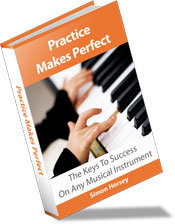Performance Anxiety

Disclaimer: This information on performance anxiety does not constitute medical advice. I am not a medical doctor or a psychologist.
Many musicians get nervous when performing and most people don't realise that performance anxiety (or performance nerves) is actually perfectly natural and happens to almost everyone, even professionals who perform often. The key is to know how to cope with anxiety during performance and use your nerves to your advantage.
Practice Performing
Probably the most obvious (and therefore sometimes the most overlooked) method of gaining control of performance anxiety is to practice performing! This may seem like an over-obvious statement to start with, but ask yourself how many times do you actually perform in front of an audience? Practice performing to get better at performing. Ask your teacher about putting on a small concert for parents/relatives/friends of performers only, or organize your own small performance. This could be in somebody's front room, a classroom at school or a small church or community center room. The key is to have a small audience in a smallish venue. This more intimate setting helps performers feel more relaxed, and even if a mistake is made during performance the audience is accepting. At my school we have a series of concerts called OnStage concerts once a month. These normally take place in the school hall because we have a Grand Piano there, but to help make it more intimate and non threatening for students the audience sit on stage with the performers. Alternatively we sometimes use our drama room as a smaller performance venue. We have around 10 students perform each month, depending who is ready with a piece. This also means students aren't over practising pieces waiting for concerts at the end of term. If a piece isn't ready one month, there is another concert next month! Students report that although performing is still scary, the small, friendly audience makes it less so. Some students who refused to perform in big, end of term concerts are now happy to play in an onstage concert, and ultimately find they can gradually play in front of larger audiences.
Perform from the start
I also encourage my students to perform early in their instrumental career. Initially I suggest to parents to have small 'concerts' for relatives or friends but to ensure there is adequate preparation time and that the students knows he or she will be performing on a certain date. One of the worst things for some students is to be dragged to their instrument without adequate notice and asked to play in front of their aunt, uncle, grandparents, neighbours etc. Performers need time to prepare, so if a relative is coming to visit, let the performer know you would like it if he or she could play something. This doesn't need to be a current piece, just a piece the performer feels comfortable playing in public. If early experiences of performance are positive, performance becomes a positive aspect of musical life.
"Nerves provide me with energy. They work for me. It's when I don't have them, when I feel at ease, that I get worried."
Mike Nichols Film Director
Controlling performance nerves
Surprisingly, being a little nervous can often be a good thing! There is more adrenaline in your system when you are nervous and this helps achieve a deeper level of concentration and focus. One of my piano students often made mistakes when performing, although he played perfectly during practice, lessons and even when being recorded. In performance though he constantly rushed pieces, playing phrases faster than the speed at which he had practiced them and finding his fingers constantly falling over each other. We used various different music practice games in an effort to help him with performing, including some games especially designed to practice performing and reduce performance anxiety. However, he still rushed. Eventually I loaned him my Peterson BB1 bodybeat metronome. This vibrating metronome allowed him to feel the speed of the beat before he started playing, which helped him not to rush. Theoretically it would be possible to run the bodybeat metronome during a performance, but it would be unusual to want to play exactly in time, with no rubato anywhere in your performance. It could be great for a drummer playing along with a MIDI sequence though! You can see the Bodybeat metronome in my Metronome store at Amazon.com or Metronome store at Amazon UK.
Biofeedback and Active Feedback
One possible way of learning how to control performance anxiety is biofeedback sessions. Biofeedback sessions help people learn to control some internal bodily processes which, as a rule, occur involuntarily. Heart rate and blood pressure, for example. Click here to read more about biofeedback for performance including some information on Active Feedback and using the WildDivine system.
Use of drugs to control performance anxiety
Some musicians do use prescription drugs to overcome nerves. I mention this because it happens, not because i approve or recommend this approach. The drugs used are beta blockers and you can read more about the use of beta blockers for performance anxiety here.
Conclusion
In conclusion: if you have practiced effectively, and practiced
performing, you should be ready to perform. Help take your practice and
performance confidence to a new level by reading my book Practice Makes Perfect! See below for further details.
Expert Practice Secrets
Frustrated with your practice? Read Practice Makes Perfect and hack the 10,000 hour rule. Cut your practice time by up to 25%! Make faster progress, learn pieces and scales faster, memorize more easily, and much more. "If you play an instrument you need this book!"
Recent Articles
-
How To Speed Up Scales and Improve Accuracy
Oct 13, 24 04:23 AM
How to speed up scales is something many people want to know, but speed should also come with accuracy. Read on to find out how to do both. -
From an opera singer, on her death bed to Leonard Bernstein
Jan 29, 24 03:36 PM
I enjoy reading the music more than hearing it. From an opera singer, on her death bed to Leonard Bernstein -
unknown
Jan 29, 24 02:52 PM
Not happy with your tone? Practice more.

New! Comments
Have your say about what you've just read!Leave me a comment in the box below.